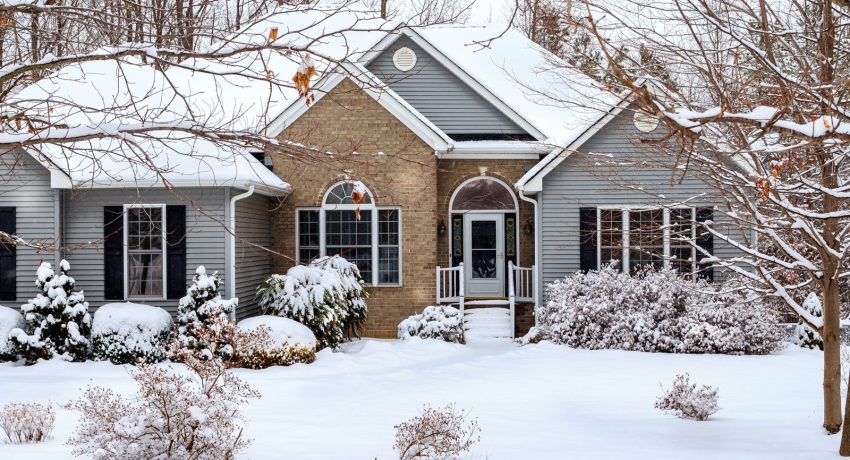As winter descends on cities and small towns across the country, many people find themselves unprepared for the havoc that frigid temperatures can wreak on their homes. Even the unpredictability of one winter season to the next can leave homeowners scrambling to ready their homes or maintain them properly in current conditions. Keeping winter home safety tips in mind at least once a year is prudent advice, therefore, for all your clients.
In areas that receive mild weather year-round, there’s not much need to consider pipe insulation or solutions for icy gutters. But, all homes can benefit from basic winter preparedness and you can help your clients know exactly what to prep for each year.
Here are some winter home safety tips you can share with your clients in your seasonal outreach this year, through a Facebook post or email newsletter.
Check Smoke and Carbon Monoxide Detectors
Homeowners should make a habit of annually testing and changing the batteries in their smoke and carbon monoxide detectors. During testing, they should make note of the detector’s expiration date and if there is no expiration date on the device, they should keep in mind the average CO detector lasts for three to five years. Smoke detectors usually last for eight to ten years.
Prepare Pipes So They Don’t Freeze
Neglecting plumbing during the wintertime can bring hazardous consequences. Homeowners can help protect their pipes from freezing and bursting by taking preventative measures. Pipes in unheated interior spaces like attics or basements, or on exterior walls, have the greatest potential to freeze. Many homeowners install frost-proof spigots to avoid pipe freezes and bursts, but those who don’t have these devices can close interior shut-off valves leading to outdoor faucets.
Schedule a Furnace Inspection
An annual furnace inspection can help homeowners ensure their heating system functions properly and efficiently throughout the year. This important winter weather safety check cuts down on dangerous conditions that can threaten the homeowner’s health and the integrity of their home. It also decreases the likelihood of costly repair bills in the future.
Monitor and Maintain Outdoor Utility Equipment
Outdoor meters and vents must be clear of ice and snow to do what they’re meant to do. Advise your clients to routinely use a brush or broom to carefully clean the meter and the area around it. Homeowners should never use heat to melt ice or snow from a utility meter. Additionally, they should be careful when plowing or shoveling snow in these areas.
Check Outdoor Exhaust Vents
Natural gas appliances like furnaces, fireplaces, clothes dryers, and water heaters require an exhaust vent. Often, these vents are plastic pipes that exit a home at its foundation. Frequently, they’re located in an exterior wall. These vents must maintain proper air flow to keep the appliances working well and maintain homeowner safety. Your clients should annually check to see that vents are clear of ice, snow, and other debris and that any flap traps are not lodged shut.
Prevent Iced-Over Gutters
Before the first snow of the year, homeowners should ensure their gutters are free of leaves, branches, and other debris. An annual gutter cleaning is an excellent way to prevent water buildup and icing over. If homeowners see icicles hanging from their gutters, it’s a good indication the situation is past due for inspection and mitigation.
Inspect and Sweep Chimneys and Fireplaces
Chimneys and fireplaces cause nearly three in ten fires associated with heating equipment. Additionally, homeowners can experience carbon monoxide poisoning from blocked chimneys and flues. As families hunker down for winter and decorate for the holidays, adorning fireplaces with trees and plants can be tempting. Caution your clients to keep a three-foot clear zone around fireplace openings and definitely avoid placing anything flammable or combustible in this area.
Prep Emergency Kits and Have an Evacuation Plan
In times of crisis, during winter and throughout the year, a well-stocked emergency kit can make the difference between safety and tragedy. Items to advise clients to keep within easy reach include a two-way radio (solar, battery, or hand-powered), flashlights, a Swiss army knife, bandages, an ice scraper, jumper cables, a cell phone charger, batteries, blankets, spare clothing, foot and hand warmers, extra food and water (for pets too), and medication. Ensure that all household members know and have practiced their family evacuation plan. Pets should have an ID tag affixed to their collar.
Are you looking for more tips to share with your clients or advice to grow your real estate business? Read articles on marketing, branding, attracting and retaining clients, and more on the Better Homes & Gardens Real Estate® Be Better Blog.








